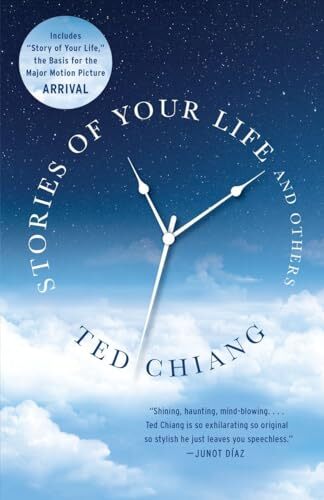
An amazing collection of SciFi short stories. Just about every single one is deeply thought-provoking, beautifully written, and unforgettable. Highly, highly recommended.
For my own notes, here are brief summaries of the short stories (WARNING: minor spoilers ahead):
-
Tower of Babylon: Imagine what it would be like to climb a tower to the heavens. Beautiful writing.
-
Understand: A man is given an experimental drug to heal his brain damage and ends up developing hyper intelligence. The idea of being aware of your own intelligence and how it works—a sort of meta-awareness—is a really cool concept.
-
Division by Zero: A mathematician accidentally discovers that all of math is inconsistent. What would it be like to discover that everything you knew was wrong? I wonder what mathematicians and scientists thought when they first saw Gödel’s incompleteness theorems.
-
Story of your Life: An alien race comes to earth and a linguist attempts to learn their language to communicate with them. The move “Arrival” is based on this short story, and is how I came across this book in the first place. It’s a fantastic story, and, as happens all too rarely, an even more fantastic movie. The story beautifully captures the idea that you can either know the future with certainty or have free will, but not both.
-
Seventy-Two Letters: A story of creating “automata” and “life” using the power of words. A wonderful metaphor for DNA and the power of information.
-
The Evolution of Human Science: This was an especially short story and the only one that I largely can’t remember. I think it was about the creation of super-advanced humans that would be able to make remarkable scientific discoveries, but be completely unable to interact with “normal” humans, including their parents.
-
Hell is the Absence of God: A story in which god, heaven, hell, miracles, and angels are all definitively known to exist, and the arrival of an angel is like a natural disaster. A bit too much religion for me, but beautifully written.
-
Liking What You See: A story of a “calliagnosia” device that can make you blind—or rather, indifferent—to the beauty of the human face. Would this make society better and more egalitarian? Or is beauty something important and enjoyable that we should not lose?
